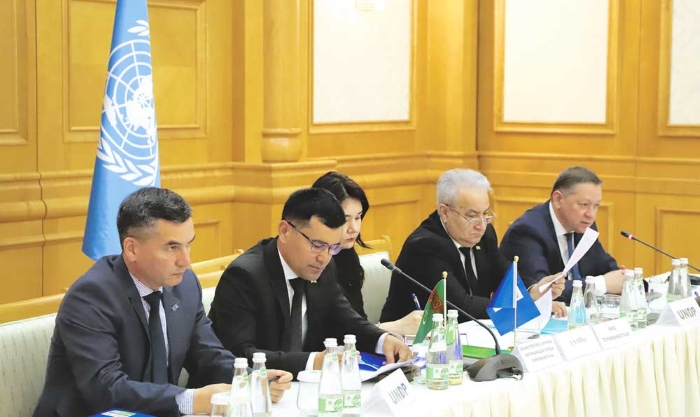Turkmenistan has reaffirmed its commitment to international climate goals with the presentation of two key reports: the updated First Biennial Report and the First Biennial Transparency Report. These documents reflect the country’s progress under the United Nations Framework Convention on Climate Change (UNFCCC), signed in 1992 and effective since 1995, as well as the Paris Climate Agreement, which marks its tenth anniversary this year. The reports were unveiled at a presentation event in Ashgabat, according to the Neutral Turkmenistan newspaper.
National Climate Expert G. Allaberdyev explained that Turkmenistan, as a developing country under the climate reporting framework, was initially required to submit reports every four years until 2014. Since then, the transition to biennial reporting has enabled more frequent updates on national climate action.
The submitted reports, compiled using data from various ministries and departments and processed in line with international methodologies, provide a set of indicators that demonstrate Turkmenistan’s progress in climate mitigation efforts.
Expert N. Allaberdyev shared details about sector-specific work, particularly within the fuel and energy complex, as well as the energy and transport sectors. These include data on technological processes, emissions from the oil and gas industry, combustion of fuel in power generation, electricity production and distribution, and hydrocarbon transport. Initial findings show a trend of emissions reduction: despite rapid economic growth and increased production, emission levels are rising only slowly. This indicates the effectiveness of cleaner industrial practices, waste management initiatives, and more cyclical production processes.
Leyla Khajimuradova, responsible for reporting on industrial processes and agriculture, noted that the reports are based on standardized units and use the Global Warming Potential (GWP) index to convert data. Accurate afforestation statistics were highlighted as key to assessing greenhouse gas absorption, as forests act as vital carbon sinks.
Key data from the presentation included:
- Peak production growth in Turkmenistan was observed in 2014, with stabilization occurring by 2020.
- Economic expansion continues to drive consumption growth, particularly due to the commissioning of new power plants and industrial facilities.
- Demographic growth has had minimal impact on emissions thanks to the widespread use of energy-efficient appliances and lighting.
- In the fuel and energy complex, specifically among the facilities of Turkmengaz State Concern, the total emissions have been reduced by more than 10%. This is due to the improvement of the operation of gas production and processing infrastructure facilities, and the elimination of leaks during the operation of gas distribution networks. The news is unique because so far only two countries in the world have achieved such success in mitigation – Australia and Turkmenistan.
Batyr Ballyev, Turkmenistan’s National focal Point for the UNFCCC, presented an overview of the country’s progress toward its Nationally Determined Contribution (NDC) under the Paris Agreement. He highlighted that Turkmenistan is meeting specific emission reduction targets as part of the Global Methane Pledge, which the country joined in December 2023. These goals are being pursued through power plant modernization—shifting from gas turbine to combined-cycle systems, expanded use of renewable energy, and efforts to reduce methane leakage during gas transport.
Turkmenistan’s legal framework fully supports its climate commitments. The National Strategy for Renewable Energy Development through 2030, along with laws such as “On Renewable Energy Sources” and “On Energy Conservation and Energy Efficiency,” are being actively implemented. Accompanying by-laws are also under development.
The Interdepartmental Commission on Environmental Protection, in collaboration with national ministries and international partners including the United Nations Development Program (UNDP), UNEP, and the German Society for International Cooperation (GIZ), continues to coordinate the implementation and periodic updates of Turkmenistan’s climate obligations. ///nCa, 8 April 2025
